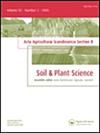Prioritising key variables for assessing food system resilience in Finland
IF 1.8
4区 农林科学
Q2 AGRONOMY
Acta Agriculturae Scandinavica Section B-Soil and Plant Science
Pub Date : 2023-09-15
DOI:10.1080/09064710.2023.2256341
引用次数: 0
Abstract
Building food system resilience enables the system to buffer, adapt and transform in response to changes. Identification of key variables of resilience support actors and policymakers managing the food systems. The objective of this study was to identify the most important variables to assess food system resilience and actors with the best opportunities to take responsibility for preparing for disruptions. We operationalised the key variables of resilience in the Finnish food system and evaluated them using a Delphi expert method. We produced a framework for food system resilience, including three indispensable interacting levels of action and good practices within each supporting resilience building. In the prioritisation of key variables, diversity in production, versatile cooperation between actors based on trust, independence of external inputs, system understanding, and renewable domestic energy were considered the most important. Research and administration play a key role in producing information and implementing actions targeted especially at agriculture, where actions are expected to be the most efficient and impactful. In the whole food system, increasing transparency would help create trust and thus promote co-creation of sustainable practices. Platforms to obtain information about future risks and for co-creating solutions for building food system resilience are needed.评估芬兰粮食系统恢复力的关键变量的优先顺序
建立粮食系统复原力使该系统能够缓冲、适应和转变以应对变化。确定恢复力的关键变量支持行为者和政策制定者管理粮食系统。本研究的目的是确定评估粮食系统恢复力的最重要变量,以及有最佳机会承担责任为中断做准备的行动者。我们对芬兰食品系统中弹性的关键变量进行了操作,并使用德尔菲专家方法对其进行了评估。我们制定了粮食系统复原力框架,包括三个不可或缺的相互作用层面的行动和每个层面支持复原力建设的良好做法。在确定关键变量的优先顺序时,生产的多样性、参与者之间基于信任的全面合作、外部投入的独立性、系统理解和国内可再生能源被认为是最重要的。研究和行政管理在提供信息和执行特别针对农业的行动方面发挥关键作用,农业方面的行动预计将是最有效和最有影响力的。在整个食品系统中,提高透明度将有助于建立信任,从而促进可持续实践的共同创造。需要有平台来获取有关未来风险的信息,并为建立粮食系统抵御力共同制定解决方案。
本文章由计算机程序翻译,如有差异,请以英文原文为准。
求助全文
约1分钟内获得全文
求助全文
来源期刊
CiteScore
4.40
自引率
0.00%
发文量
56
审稿时长
2.3 months
期刊介绍:
Acta Agriculturæ Scandinavica Section B publishes original research in applied soil and plant science with special attention given to to crop production in agri- and horticultural systems. We welcome manuscripts dealing with:
Climate smart and sustainable crop production systems
Water and nutrient efficiency
Soil conservation and productivity
Precise agriculture systems
Applications of bio- and nanotechnology
Digitalisation and robotics
Soil-plant interactions
Acta Agriculturæ Scandinavica, Section B – Soil & Plant Science forms part of a series of titles published on behalf of the Nordic Association of Agricultural Science (NJF). The series also includes Section A - Animal Science .

 求助内容:
求助内容: 应助结果提醒方式:
应助结果提醒方式:


